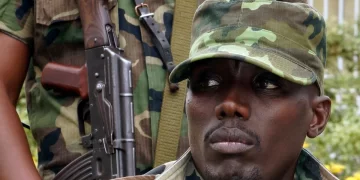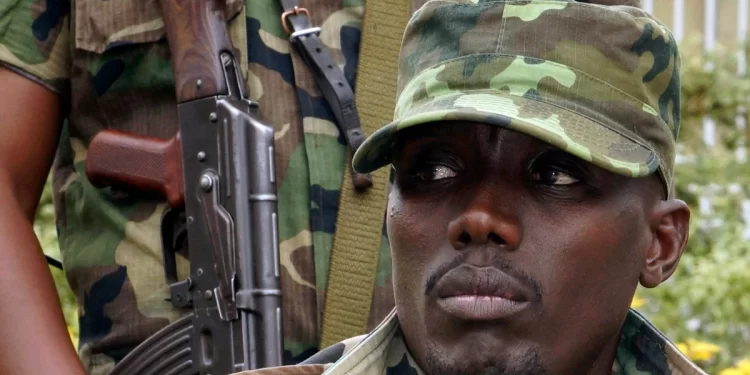The M23 rebels operating in the eastern North Kivu province of the Democratic Republic of the Congo (DRC) on Friday afternoon gained control of Kitagoma border town, forcing hundreds of Congolese nationals to flee into Uganda’s Kisoro District.
This is the second border town to be captured by the rebels following the takeover of Bunagana border town in June.
The rebels spokesperson, Maj Willy Ngoma, confirmed the capture of Kitagoma border town “on Friday at around midday after flashing out the Congolese government soldiers.”
Maj Ngoma appealed “to the fleeing Congolese nationals to return home”, promising to “provide a conducive environment for the children to study and those doing farming to do it without being disturbed.”
Mr Shafique Ssekandi, the Kisoro Resident District Commissioner, estimated the number of Congolese nationals who fled into Kisoro District on Friday to be about 1,000 individuals. He added that plans to transport them to Nyakabande refugee transit centre were ongoing, where they would be screened before they are relocated to settlement camps in western Uganda.
“If they feel they are safe, they are free to return home, and if not, the government of Uganda, together with the UNHCR, are ready to transport them to the Nyakabande refugee transit camp,” he said, adding, “We do not have enough food to feed them. That is why they must be relocated to the settlement camps.”
Mr Ssekandi said business at Busanza border in Kisoro, which shares a border with Kitagoma, was dull.
“Pupils studying in the border schools were sent home because of heavy fighting that started early morning of Friday, while local residents in the border villages were frightened,” he confirmed.
Some of the fleeing Congolese nationals, who included Niringiye Sebishoma, said they don’t entertain the thought of returning to the DRC for now.
“Returning to DRC is risky because I am not sure the M23 rebels will protect us,” Mr Sebishoma said, adding, “The M23 rebels always favour Congolese of Tutsi origin and marginalise those of Hutu origin. I better go to the settlement camps in Uganda.”
Nearly 60,000 Congolese refugees from 30,175 households crossed into Kisoro District in March when fighting erupted between the M23 rebels and Congolese government forces.
Some of them accepted to be relocated to the settlement camps in Uganda, while others opted to return home.
UN steps up ‘troop alert level’
The UN peacekeeping mission in the Democratic Republic of Congo on Saturday announced an increase in its “troop alert level” following deadly clashes with rebels in the east.
The MONUSCO mission condemned “the hostile acts of M23” rebel group and called for an immediate halt to the fighting.
It was providing “air support, intelligence and equipment” as well as medical assistance to the DRC’s army, the mission said on Twitter.
The peacekeepers said they were “mobilised in support” of the FARDC army which clashed this week with the M23 around a strategic highway, with residents reporting at least ten people dead since Sunday and dozens more injured.
MONUSCO said it had set up an “operations coordination centre” with the army and was carrying out reconnaissance and surveillance flights, but did not provide further details about the alert level.
Several witnesses told AFP by telephone on Saturday that the M23 had seized control of Kiwanja and Rutshuru-centre, along the RN2 highway linking the North Kivu provincial capital Goma with the north and Uganda.
M23, a mostly Congolese Tutsi group, resumed fighting in late 2021 after lying dormant for years.
It has since captured swathes of territory in North Kivu province, including the strategic town of Bunagana on the Ugandan border in June.
The group’s resurgence has destabilised regional relations in East Africa, with the DRC accusing its smaller neighbour Rwanda of backing the militia.
The rebel group first leapt to prominence in 2012 when it briefly captured Goma before a joint Congolese-UN offensive drove it out.
The militia is one of scores of armed groups that roam eastern DRC, many of them a legacy of two regional wars that flared late last century.
By AFP











